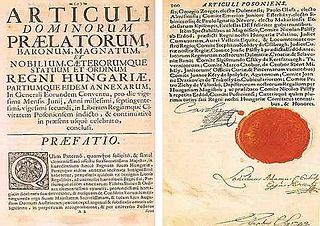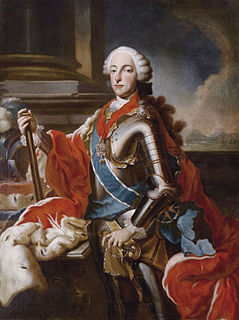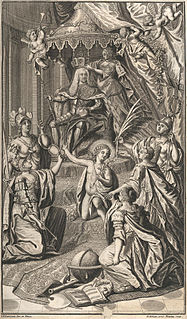Background
Maximilian III Joseph, the elector of Bavaria, died of smallpox on December 30, 1777, leaving no immediate heirs. He was succeeded by his distant cousin Charles Theodore, then elector of the Electoral Palatinate. Under the provisions of the Peace of Westphalia covering a merger of family lines, the vote of the Palatinate was suppressed, and Charles Theodore, while ruling both territories, would hold one vote as elector of Bavaria.
War of the Bavarian Succession
As Charles Theodore also had no immediate legitimate heirs, his cousin Charles II August, the duke of Zweibrücken, was entitled to inherit both Bavaria and the Palatinate. When Charles Theodore, who preferred to live in the Palatinate, offered southern Bavaria to Joseph II, Holy Roman Emperor in exchange for part of the Austrian Netherlands, Charles August objected. He was joined in this objection by Prussia and Saxony, both of whom were wary of any increase in Austrian power in Central Europe. The resulting war was settled by the Treaty of Teschen of May 13, 1779, which granted the Innviertel to Austria, affirmed Charles Theodore's inheritance of the entire Bavarian electorate, and recognized some Prussian territorial claims.
Election of 1790
Joseph died on February 20, 1790. The electors called to Frankfurt to choose his successor were:
Leopold was also king of Hungary and grand duke of Tuscany. In the latter role, he had been a reformer and constitutionalist, and his election offered the potential of the spread of similar reforms in Austria and the broader Empire.

The prince-electors, or electors for short, were the members of the electoral college that elected the emperor of the Holy Roman Empire.

The County Palatine of the Rhine, later the Electorate of the Palatinate or simply Electoral Palatinate, was a territory in the Holy Roman Empire administered by the count palatine of the Rhine. Its rulers served as prince-electors from "time immemorial", were noted as such in a papal letter of 1261, and were confirmed as electors by the Golden Bull of 1356.

The House of Wittelsbach is the Royal Bavarian dynasty from Germany, with branches that have ruled over territories including Bavaria, the Palatinate, Holland and Zeeland, Sweden, Hungary, Bohemia, the Electorate of Cologne and other prince-bishoprics, and Greece. Their ancestral lands of the Palatinate and Bavaria were Prince-electorates, as well as the Archbishopric-Electorate of Cologne, and the family had three of its members elected emperors and kings of the Holy Roman Empire. Their Kingdom of Bavaria was created in 1805 and continued to exist until 1918.

The Pragmatic Sanction was an edict issued by Charles VI, Holy Roman Emperor, on 19 April 1713 to ensure that the Habsburg hereditary possessions, which included the Archduchy of Austria, the Kingdom of Hungary, the Kingdom of Croatia, the Kingdom of Bohemia, the Duchy of Milan, the Kingdom of Naples, the Kingdom of Sardinia and the Austrian Netherlands, could be inherited by a daughter.

The War of the Bavarian Succession was a dispute between the Austrian Habsburg Monarchy and an alliance of Saxony and Prussia over succession to the Electorate of Bavaria after the extinction of its ruling House of Wittelsbach. The Habsburgs sought to acquire Bavaria, and the alliance opposed them, favoring another branch of the Wittelsbachs. Both sides mobilized large armies, but the only fighting in the war was a few minor skirmishes. However, thousands of soldiers died from disease and starvation, earning the conflict the name Kartoffelkrieg in Prussia and Saxony; in Habsburg Austria, it was sometimes called the Zwetschgenrummel.

Maximilian III Joseph, "the much beloved", was a Prince-elector of the Holy Roman Empire and Duke of Bavaria from 1745 to 1777.

The Treaty of Teschen was signed on 13 May 1779 in Teschen, Austrian Silesia, between the Austrian Habsburg Monarchy and the Kingdom of Prussia, which officially ended the War of the Bavarian Succession.

The Electorate of Bavaria was an independent hereditary electorate of the Holy Roman Empire from 1623 to 1806, when it was succeeded by the Kingdom of Bavaria.

Maria Anna Sophia of Saxony was a daughter of King Augustus III of Poland and his wife Maria Josepha of Austria who became Electress of Bavaria.

Charles II August Christian was Duke of Zweibrücken from 1775 to 1795. A member of the Palatine House of Zweibrücken-Birkenfeld, a branch of the House of Wittelsbach, he was the elder brother of the first King of Bavaria, Maximilian I, and of Queen Amalia of Saxony.

The Diet of Regensburg of 1623 was a meeting of the Imperial States of the Holy Roman Empire convened by Holy Roman Emperor Ferdinand II. The meeting was not technically an imperial diet in the full sense, but a convention of princes or Deputationstag – a looser constitutional format giving the emperor greater leeway to take decisions without being bound by formal procedures. At it the Electorate of the Palatinate was transferred to Maximilian I of Bavaria. The meeting marked the high-water mark of imperial power during the Thirty Years' War.
The imperial election of 1619 was an imperial election held to select the emperor of the Holy Roman Empire. It took place in Frankfurt on August 28.
The imperial election of 1658 was an imperial election held to select the emperor of the Holy Roman Empire. It took place in Frankfurt on July 18.
The imperial election of 1690 was an imperial election held to select the emperor of the Holy Roman Empire. It took place in Augsburg on January 23.
The imperial election of 1711 was an imperial election held to select the emperor of the Holy Roman Empire. It took place on October 12.

The imperial election of 1742 was an imperial election held to select the emperor of the Holy Roman Empire. It took place in Frankfurt on January 24. The result was the election of Charles Albert of Bavaria, the first non-Habsburg emperor in hundreds of years.
The imperial election of 1745 was an imperial election held to select the emperor of the Holy Roman Empire. It took place in Frankfurt on September 13.
The imperial election of 1764 was an imperial election held to select the emperor of the Holy Roman Empire. It took place in Frankfurt on March 27.
The imperial election of 1792 was the final imperial election held to select the emperor of the Holy Roman Empire. It took place in Frankfurt on July 5.
This page is based on this
Wikipedia article Text is available under the
CC BY-SA 4.0 license; additional terms may apply.
Images, videos and audio are available under their respective licenses.











